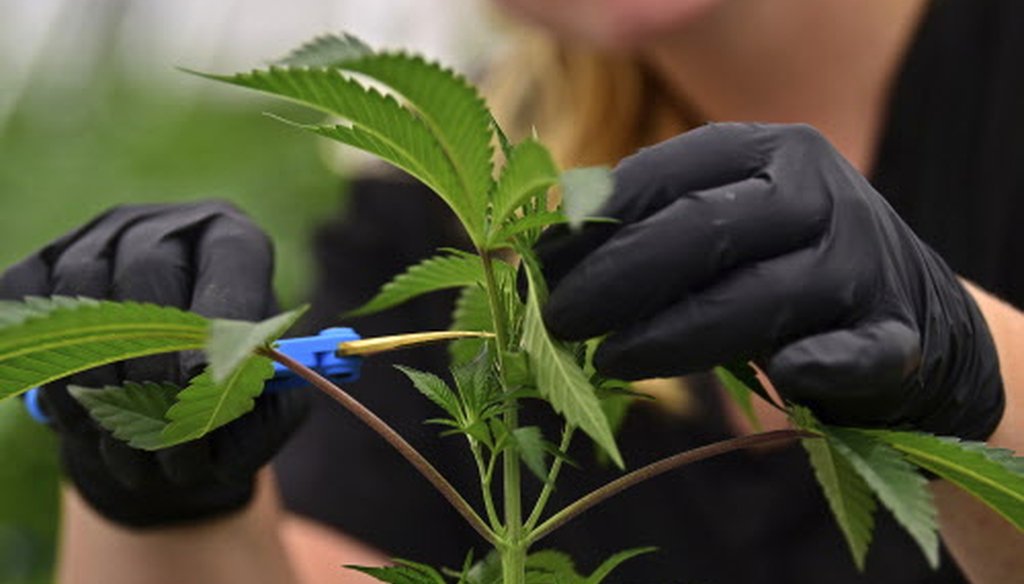

Our only agenda is to publish the truth so you can be an informed participant in democracy.
We need your help.


Marijuana is a Schedule I hallucinogenic substance under the Wisconsin Uniform Controlled Substances Act. Penalties can vary, depending upon the amount or whether it is person’s is a first or multiple offender. (Associated Press)
Research shows marijuana can lead to psychotic disorders like schizophrenia, particularly if people start using it as children and teenagers.
The risk is greatest among those who use it regularly.
The debate over marijuana has lit up in Wisconsin.
Gov. Tony Evers proposed legalizing recreational and medical marijuana in the 2021-23 state budget he unveiled in February. He contends the move would ensure safe products are available to users while providing a new source of revenue for rural schools and programs for marginalized communities.
Wisconsin is in a minority of states that haven’t legalized the drug for medical or recreational use.
Republicans are likely to knock down Evers’ proposal after rejecting similar efforts in the previous state budget, though some may be open to medical marijuana. One GOP senator has already made clear why he won’t support legalization.
"The National Academy of Medicine points to a significant correlation between marijuana and psychosis, schizophrenia, and other psychotic disorders, particularly in teenagers where the risk of developing schizophrenia increases three fold," state Sen. Chris Kapenga, R-Delafield, said in a Feb. 10, 2021 tweet.
In response to Kapenga's claim, state Sen. Melissa Agard tweeted "Youth usage of marijuana has actually gone down in states that have fully legalized." We rated Agard's claim Half True.
There’s a lot to unpack here. Let’s dig in to Kapenga's claim.
First, a programming note: Marijuana has many purported impacts on health. Kapenga’s claim focused on schizophrenia and psychotic disorders, so that’s what we’ll address here.
When asked for evidence to support his claim, the senator cited several articles that examined the relationship between marijuana and psychotic disorders. According to a definition from the National Institute of Mental Health, people experiencing psychosis have lost some contact with reality and can endure hallucinations or delusions.
We’ll start with the research Kapenga referenced in his tweet.
The National Academies of Sciences, Engineering, and Medicine created a committee to examine scientific literature on the health effects of marijuana, both positive and negative. The resulting 2017 report found "substantial evidence" that marijuana use can increase the risk of developing schizophrenia or other psychotic disorders, with the risk increasing among frequent users.
On the other end of the spectrum, researchers indicated that people with schizophrenia or other psychoses and a history of marijuana use may perform better on cognitive learning and memory tasks.
The findings in the National Academies report are cited by the Centers for Disease Control and Prevention. And a separate 2019 study in Europe found the odds of a psychotic disorder increased among daily marijuana users, particularly among those using strains with a higher THC content. (THC is the compound that produces a high.)
So, Kapenga is right that a correlation exists between marijuana and psychosis — though it’s worth emphasizing that the chances are greater if you use it often.
What about the impact on teenagers?
The National Academies report doesn’t directly discuss this aspect of the issue, as Kapenga’s tweet suggests. But he did cite a 2002 study in New Zealand that found "a tenth of the cannabis users by age 15 in our sample developed schizophreniform disorder by age 26 compared with 3% of the remaining cohort." That translates to more than 3 times the cases in early marijuana users.
According to another study, 15 and 16 year olds who tried marijuana were more likely to exhibit three or more early symptoms of psychosis, even when reachers controlled for previous behavioral symptoms.
Overall, researchers believe people who smoke marijuana regularly before age 14 have a 2 to 3 times greater risk of developing schizophrenia or a psychotic disorder, said Daniel Yohanna, an associate professor of psychiatry at the University of Chicago. That figure aligns with what Kapenga referenced in his tweet.
"We think that the earlier you smoke and the more you smoke, other factors being controlled for, you have an increased risk of developing schizophrenia," Yohanna said.
In a tweet, Kapenga said "the National Academy of Medicine points to a significant correlation between marijuana and psychosis, schizophrenia, and other psychotic disorders, particularly in teenagers where the risk of developing schizophrenia increases three fold."
There’s extensive research that shows marijuana can lead to psychotic disorders like schizophrenia, particularly if people start using it as children or teenagers. That said, the risk is greatest among frequent users — not those who occasionally light up at a party.
We rate Kapenga’s claim True.
Milwaukee Journal Sentinel, Gov. Tony Evers will propose legalizing recreational and medical marijuana as part of the next state budget, Feb. 7, 2021.
National Institute of Mental Health, What is Psychosis?, accessed Feb. 26, 2021.
The National Academies of Science, Engineering, and Medicine, The Health Effects of Cannabis and Cannabinoids, accessed Feb. 26, 2021.
Centers for Disease Control and Prevention, Mental Health, accessed Feb. 26, 2021.
The Lancet, The contribution of cannabis use to variation in the incidence of psychotic disorder across Europe (EU-GEI): a multicentre case-control study, March 19, 2019.
BMJ, Cannabis use in adolescence and risk for adult psychosis: longitudinal prospective study, Nov. 23, 2002.
The British Journal of Psychiatry, Association of cannabis use with prodromal symptoms of psychosis in adolescence, accessed March 4, 2021.
In a world of wild talk and fake news, help us stand up for the facts.
